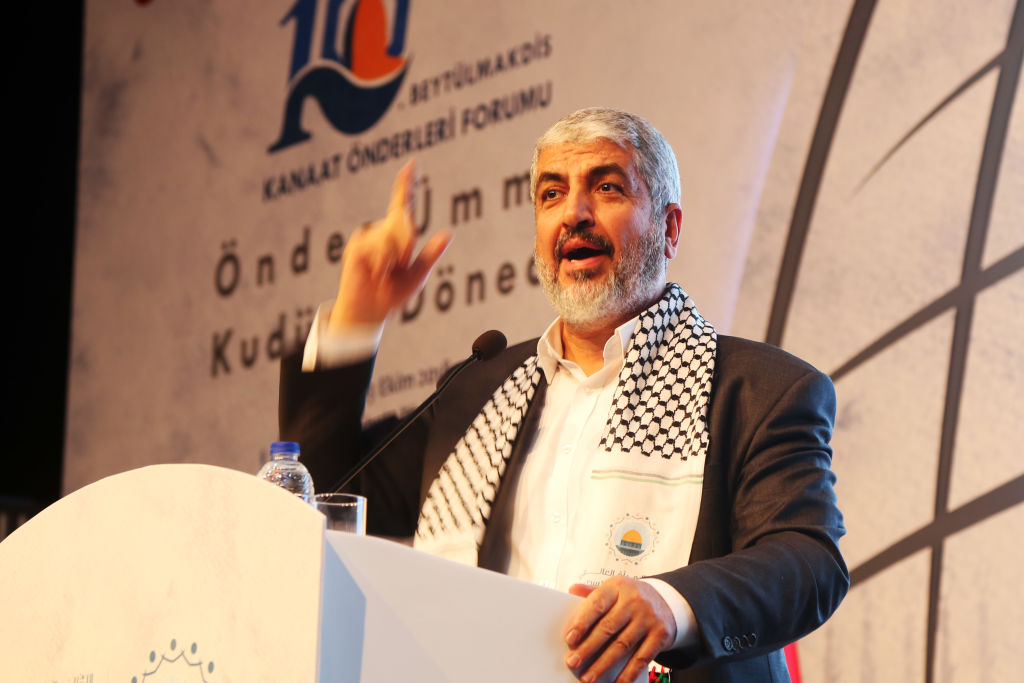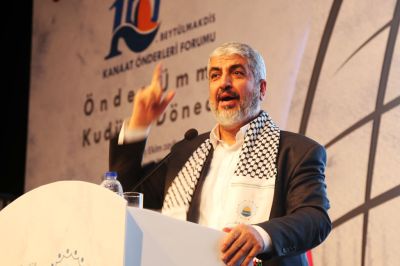Hamas chief and October 7 mastermind Yahya Sinwar is dead. In contrast with the recent series of strikes that culminated in the death of Hezbollah chief Hassan Nasrallah, this was not one of those signature Israeli pinpoint operations driven by intelligence. It was dumb luck that a handful of young Israeli soldiers on patrol stumbled upon the most wanted man in Gaza. Regardless, the momentum of this war has unmistakably shifted.
And now it’s crucial to capitalize on this shift in momentum. That’s not likely to happen through garden variety calls for diplomacy by the Biden administration. The proper move for the White House is to play hardball—and not with Israel, for a change. Rather, it’s with Qatar.
First, some background: Sinwar became Hamas’ leader in Gaza in 2017. He consolidated his control of the group in August following the assassination of Hamas political chief Ismail Haniyeh, adding the political and military files to his portfolio—all while running the war from underground tunnels.
In consolidating power, Sinwar snubbed Hamas’ de facto foreign minister, Khaled Meshal, who had been expected to succeed Haniyeh. Operating out of Hamas’ external headquarters in Qatar, Meshal appeared destined for obscurity. What a difference a few months can make. Meshal today is among the last remaining recognizable figures on the Hamas org chart. It’s likely (although not certain) that he will reemerge as one of the group’s top leaders.
Meshal is a founding member of Hamas. His decades-long career in the terrorist organization has taken him from Kuwait to Jordan (where he survived an Israeli assassination attempt), to Syria (where he became head of the group’s politburo), and finally to Qatar, where Meshal emerged as the group’s chief envoy.
Meshal has lived like royalty in Qatar since 2012. Reports suggest that he has amassed billions of dollars while he has been based in the tiny Gulf emirate. Remarkably, the U.S. government, under both Democrat and Republican administrations, has failed to call upon Qatar to freeze his assets and arrest him. The logic for doing so is no great mystery. Meshal is a U.S. specially designated global terrorist (SDGT), a designation that bears clear legal and economic consequences.
And yet, even as Qatar continued to host Meshal and a gaggle of other Hamas leaders, the Biden administration bestowed upon the regime in Doha the distinction of “major non-NATO ally.” The White House also extended the lease on Al Udeid, the American air base in Qatar, this past year, as Hamas leaders based there continued to reject ceasefire deals and refused to release the Israeli hostages held by their counterparts in Gaza. This was all infuriating. But Sinwar’s death gives the U.S. an opportunity to make up for lost time and compel Qatar to act like a true ally and expel one of the world’s top terrorists. Doha should be forced to freeze Meshal’s assets and then extradite him to the U.S. or Israel. Meshal’s inclusion on the SDGT list justifies such action on its own, as do the terrorism, murder conspiracy, and sanctions-evasion charges that the U.S. Department of Justice unsealed against him in September. And just last month, Meshal encouraged Palestinians in the West Bank to return to “attacks of self-sacrifice”—suicide bombings—against Israelis.
But before Meshal is sent elsewhere to account for his crimes, the Qataris should sit him down in front of a camera at the Al-Jazeera headquarters in Doha. The Qatar-controlled television station has been cheerleading for Hamas for the last 13 months—if not the last 28 years. Meshal must be compelled to surrender unconditionally on behalf of Hamas and to call for the release of the remaining 101 hostages (seven of whom are American citizens).
Meshal’s surrender would not mean the end of Hamas, but it would mean the end of war in Gaza. Moreover, Meshal’s surrender could jumpstart the process of de-Hamasification in Gaza, which is a core Israeli objective and an essential aspect of postwar planning and reconstruction.
The war will not end until Hamas waves the white flag. And Qatar is the key. But if the Biden administration waits too long to wield its influence, the Qataris may allow Meshal to leave for another jurisdiction hospitable to Hamas, perhaps Turkey.
Former Qatari Foreign Minister Khalid bin Mohammed Al Attiyah once publicly touted Meshal as a “dear guest of Qatar.” That is no longer sustainable, if it ever was. The U.S. has missed too many opportunities to deal with Meshal and hold Qatar accountable. Sinwar’s death gives Washington its best opportunity yet to do so, and to facilitate the end of this yearlong crisis in the process.






Please note that we at The Dispatch hold ourselves, our work, and our commenters to a higher standard than other places on the internet. We welcome comments that foster genuine debate or discussion—including comments critical of us or our work—but responses that include ad hominem attacks on fellow Dispatch members or are intended to stoke fear and anger may be moderated.
With your membership, you only have the ability to comment on The Morning Dispatch articles. Consider upgrading to join the conversation everywhere.